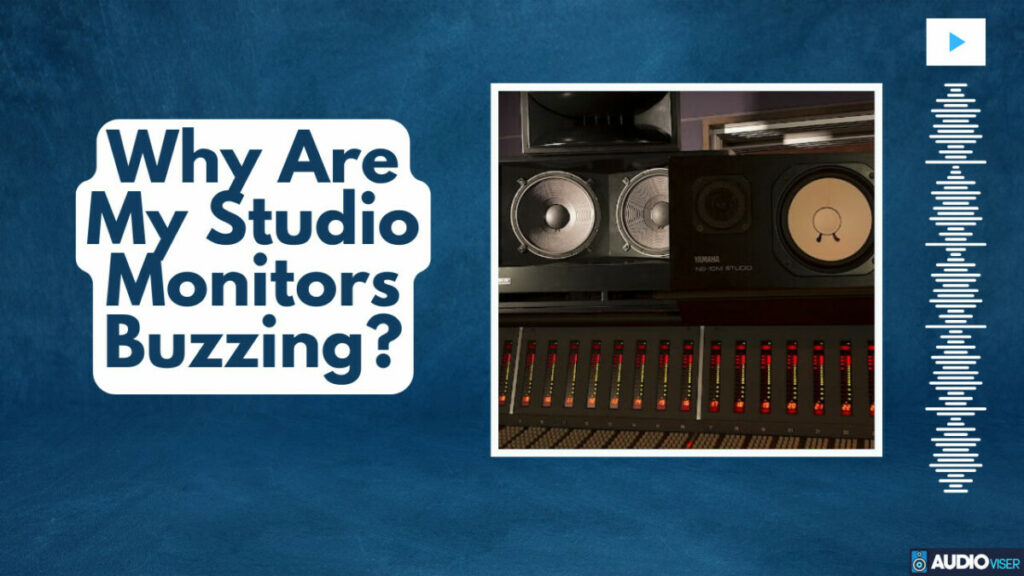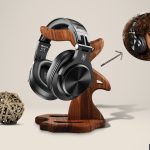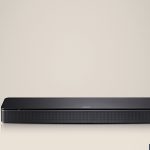Hey, did you realize that a whopping 60% of recording artists have to deal with that irritating buzzing sound from their studio monitors? Yeah, it’s a real buzzkill (excuse the pun).
But, take a deep breath. It’s not just you – and luckily, there are fixes. In this piece, we’ll walk you through the usual suspects for that pesky buzz in your monitors.
We’ll look at how your gear and wiring could be playing a part and give you a detailed, step-by-step guide to nixing that noise.
So, let’s take a plunge into your sound system, break down the mystery of that annoying buzz, and get you back on track with your pristine audio.
Why Does Your Studio Monitor Keep Buzzing?
The buzzing you’re hearing usually comes from a glitch in the electrical flow. This causes a so-called ‘ground loop’, basically a pesky buzz that messes with your audio.
Now, let’s move onto Buzzing Frequency Analysis. Sounds fancy, right? It’s just a way to figure out where the buzz is coming from by looking at its frequency. For example, a high-frequency buzz might mean there’s something up with your cables.
Lastly, figuring out your Buzz Patterns can be super helpful. Is the buzz always there or does it come and go? Does it shift when you turn up the volume or change inputs? These patterns are like breadcrumbs leading you to the source of the issue.
That’s your crash course on why your monitor might be sounding more like a buzzer-bee than a high-quality audio device.
Step-by-Step Guide to Troubleshooting Buzzing Studio Monitors
First things first, let’s take a look at your cables. Keep an eye out for any signs of wear and tear or any damage. These issues could potentially mess up the grounding, triggering that pesky buzzing sound in your monitors. If you spot any problems, don’t hesitate. Get those cables replaced ASAP.
Next up, let’s talk about your equipment’s grounding. If it’s not done right, it’s a straight ticket to hum and buzz city. The solution? Simply make sure your equipment is connected to a properly grounded outlet. Should sort that out in no time.
Lastly, consider giving your monitors some space. They might be picking up interference from other gadgets. And still, if the buzzing won’t let up, it’s probably time for some professional help. Your monitor might need a bit of servicing.
And there you’ve it! You’re now armed with enough know-how to tackle those bothersome sounds. Happy troubleshooting!
Common Causes Behind Unwanted Studio Monitor Sounds
Knowing your gear and understanding potential issues can really help you troubleshoot like a boss and make sure your sound quality is on point. So yeah, it might be a bit of a hassle, but trust me, it’s worth it for that perfect sound.
Let’s break it down with this sweet little table:
| What’s Happening | What’s Going Wrong | How to Fix It |
|---|---|---|
| Buzzing Noise | Your cables are on the fritz | Swap them out for some top-notch ones |
| High Frequency Buzz | Electrical Interference messing with your groove | Shielded cables and power conditioners are your new best friends |
| Constant Hum | Ground Loop Interference is bringing you down | DI boxes or ground lift adapters will save the day |
| Unwanted Noise | Your equipment’s isolation is subpar | Time to invest in some decent isolation pads |
| Hissing Sound | Issues with your internal amplifier | Might be time for a pro repair or maybe even a replacement |
The Role of Equipment and Wiring in Studio Monitor Buzzing
On your journey to hit that perfect sound, it’s super critical to get that your gear and wiring aren’t just bit players, but major influencers in causing those pesky noises. Dodgy equipment or badly rigged systems are like a green light for buzz, hum, and hiss to crash your studio monitors.
Let’s break down some typical troublemakers:
- Interference Sources: Think of other electronic devices around like uninvited guests at a party. Their electromagnetic interference can bring in a buzzing sound.
- Ground Loops: This is like some weird science thing where two devices have different ground potentials and that results in a super annoying hum.
- Faulty Cables: If your cables have seen better days or are just low-quality, they can invite noise into your audio system.
- Poor Power Supply: Not-so-stable or dirty power sources can also be a party to causing buzzing.
Professional Solutions and Prevention Strategies for Buzzing Monitors
If those annoying monitor noises are still haunting you, despite trying every trick in the book, it’s time to level up. Calling in a pro can do the trick. They’ll help you sniff out grounding issues and tackle that buzzing sound messing with your vibes.
Here’s the lowdown on four strategies you might wanna try:
- Ground Control: Make sure all your gear is grounded right. This can zap out any electrical interference messing with your sound.
- Cable Quality Matters: Shell out a bit more for shielded cables. These bad boys can cut down on the buzz caused by signal interference.
- Tweak the Frequency: Play around with the frequency on your stuff until that buzzing noise is just a bad memory.
- Call in the Calvary: If you’ve tried it all and nothing’s working, it’s time to get some pros involved. They’ll figure out and fix the problem, often faster and better than you could on your own.
And remember, a stitch in time saves nine. Regular check-ups can stop potential problems dead in their tracks.
Composer & Audio Engineer
I’m a composer and audio engineer crafting sonic magic. Combining my skills in rhythm, harmony, and sound synthesis to create the ultimate auditory experience.









